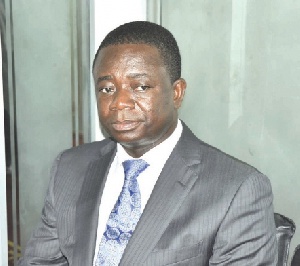Chief Executive Officer (CEO) of Ghana Cocoa Board (COCOBOD), Dr. Stephen Kwabena Opuni, has assured cocoa farmers in the six cocoa growing regions, they would have their free hybrid seedlings early this year, specifically during the raining season, to enable them plant long before the dry season sets in.
This year’s distribution of the hybrid seedlings begin from March to August and farmers, who will put in request, will be provided with the free seedlings after they meet the necessary requirement of prepared land.
The assurance from Dr. Opuni, comes on the heels of some complaints by farmers that government’s free seedlings distributed late last year came in late, leading to most of these seedlings dying after they were planted, because the rains had stopped at the time.
The free hybrid seedlings project, is also being carried out to enable farmers with over age farms, disease-stricken plants and abandoned farms to be replaced with these hybrid seedlings for better yields.
These seedlings, have been used in Cote D’Ivoire nearly 30 years, thus accounting for their higher yields and huge cocoa revenue in the economy.
The Ghanaian farmers are now expected to receive a total of 60 million seedlings this year, and according to COCOBOD, in the next 10 years, farmers are going to receive this number each year.
Dr. Opuni, said this during a trip with officials from DZ Bank -German to some cocoa farms in the Eastern Region, where syndicated loans, obtained from the bank, are being used for different projects to boost the Cocoa sector.
The team first visited Brekumanso, a village in the West Akyem Municipality, where a road is being constructed and some 27 labourers are nursing some 400 thousand hybrid seedlings for distribution.
Here, just like many other areas where seedlings are being nursed, COCOBOD, has built boreholes both for the seedlings and the community, so that during the dry season, the seedlings can get regular water supply. The team also inspected a cocoa farm at Akwadum, also in the Eastern Region.
The team also inspected the popular US$750 million “cocoa roads” project being constructed with loans from the bank. They include; Adeiso, Suhum, Nsawam, Bunso, Apegya Junction, Nkwakaw, and New Abrem, all in the Eastern Region.
The DZ Bank -German officials, also saw how cocoa beans are nursed to seedlings, planted to yield fruits, harvested, dried and used for the various finished products such as chocolate, lotions, drinks among others.
The DZ bank’s officials led by Senior Vice President, Head of Structured Trade and Commodity Finance, Dagmar Werner, have loaned moneys to COCOBOD over the past 20 years, and it was revealed COCOBOD, has never defaulted over the period.
A confident-looking Dr. Opuni assured the bank officials:“We are not going to default, COCOBOD, has an incredible tract record”.
Until 2014, fertilizer was for sale except that it was subsidized, but owing to the government’s commitment to increase yield, President John Mahama, directed that the fertilizer should be given out to the farmers for free alongside the “mass cocoa spraying” exercise.
The COCOBOD boss said the time has come for Ghanaians to see cocoa farming as a “business and not a way of life”, adding government was committed to provide all the incentives to attract more people into the sector.
He said, all over the country, some 40 thousand youth have been identified and every effort is being made to make them stay in that sector. COCOBOD scholarship he said will continuously be made available to children of farmers who qualify to pursue higher learning.
The Eastern Regional Best Farmer, Nana Obeng Akrofi who expressed concerns over the destruction of lands by illegal miners popularly called “galamsey”, Dr. Opuni said government was equally concerned about the menace and promised “we know the importance of cocoa and so we won’t sit down and allow them to destroy the farms”.
Nana Obeng Akrofi commended government for the many interventions especially the construction of the cocoa roads, the provision of seedlings and the free fertilizer.
He however demanded that government needs to stop the illegal mining in the cocoa areas added that if these laudable measures are in place it will be counterproductive to both government and the farmers, if the “galamsey” menace is not curtailed.
At a durbar at Akwadum, the chief of the town, Nana Osei Owusu Agyare II, aside decrying last year’s delay of seedlings and mass sparing exercise, expressed concern about how developers from the real estate business are using deception to acquire lands from them which they later sell to people for other purposes.
He was, however, excited that government was doing everything possible to ensure that cocoa farmers benefit from the many interventions put in place and asked that more of the roads be constructed in his area to facilitate free transportation of the commodity to the cities.
Leader of DZ Bank, Dagmar Werner, was particularly satisfied that the money was being put into good use with the farmers benefiting directly from the policies and programmes by government.
Business News of Thursday, 11 February 2016
Source: The Herald

















